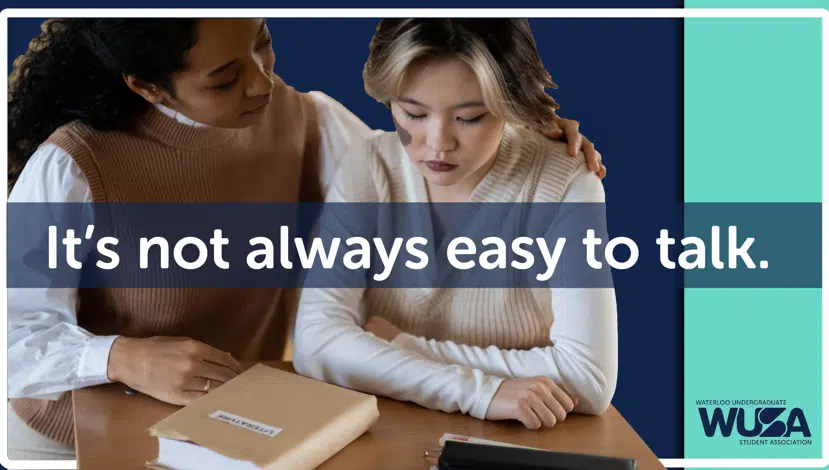Talking About Mental Health – Our Way

This January as attention is drawn to corporate mental health campaigns; we want to recognize that talking about our mental health isn’t always easy. Some topics are quite heavy, and sometimes those around us aren’t in the mental space to listen. And while it’s tempting to hold things in and not ‘burden’ anyone with our feelings, we don’t recommend that approach.
The key is really communicating – asking if someone is emotionally available to support you, letting them know that if they feel overwhelmed by what you’re telling them that they need to let you know.
No matter what issue you may be dealing with, remember that you don’t have to cope with it on your own, and if your friends and family aren’t ready to listen, know there is support available when you are ready to talk. We also hope the resources shared here will help give you some direction in your own mental health journey.
Who do I talk to?
For some of us, we might be ready to talk about our emotions but feel as though we have nobody to turn to. It’s not always easy talking to colleagues and peers about personal matters. However, there are counselling and peer support options through WUSA and the university that are free for University of Waterloo students that can guide you towards solutions that will work best for you.
Counsellors and therapists are trained to help individuals sort through many diverse types of situations. A counsellor can be an objective and supportive listener who is familiar with discussing concerns such as difficulties communicating with family, friends, and colleagues, problems with romantic relationships, or worries about academic goals.
WUSA offers Waterloo undergraduates support through the following student-run services:
MATES (Mentor Assistance Through Education and Support)
MATES is a one-to-one student peer support program offered by WUSA and Campus Wellness. It provides support to students who are hoping to build social skills or are experiencing personal or academic concerns or low-level mental health and wellness difficulties.
Glow Centre for Sexual & Gender Diversity
Glow is the oldest continuously running queer and trans student organization in Canada. It offers a wide variety of discussion groups, social events, advocacy opportunities, awareness campaigns, resources, and information.
Racial Advocacy for Inclusion, Solidarity & Equity (RAISE)
RAISE is a student-run service that aims to address issues of racism and xenophobia across campus.
The Women’s Centre aims to provide a female-positive and supportive environment on campus for all women and trans folks. It holds workshops, events, film screenings, and campaigns to educate individuals on various issues through an intersectional feminist lens.
There are also workshops and training opportunities on campus through the university that are here to help:
Counselling Services – Workshops and Groups
Offers workshops and therapy groups on various subjects including anxiety management, depression, creating sustainable habits, and much more.
Counselling Services – Pre-recorded Seminars and Workshops
Find pre-recorded video seminars on topics like stress management, sleep tips, and more.
What if I don’t know how I feel?
A large part of sharing your emotions effectively with others is being able to correctly identify your feelings. As difficult emotions can often be complex, it is important to take a moment to reflect on how you are feeling. If you are finding it hard to identify what you are feeling, you may want to consider focusing on sensations in your body. Sensations in the body can often give us clues about our feelings such as fear or anger.
Just like you can have many items jampacked in your closet, you can also be dealing with many layers of emotions and stored memories from the past. We can keep pushing down our emotions like stuffing items into our closet, but at some point, it is beneficial to examine each emotion individually to determine what we can let go.
I can’t find the words
If you are finding it challenging to express how you feel, journaling or creating works of art can be helpful tools for exploring and expressing your emotions. As well, it can help you to discover new insights about yourself and your life that you might not have known. Learning how to express your thoughts and feelings does not simply happen overnight. However, when you engage in self-reflection and practice releasing your emotions, you may find it easier to decipher how you are feeling and identify what events might have caused those feelings.
How will friends and family react?
It can sometimes be challenging to talk about your feelings with those closest to you including friends or family. Many times, we feel worried about sharing something that is personal and feel nervous about what they might think or how it might influence our relationship with them.
Here are some pointers to help you start the conversation:
Plan what you would like to say
If you are finding it difficult to put what you want to say into words, it can be helpful to write down some notes in advance to prepare for the conversation. Notes can help you organize your thoughts and ensure that you are communicating in an effective way.
Find a private space to talk
Try to choose a time when you are most relaxed and can have their full attention and a place where you feel safe and comfortable.
Be open about how you are feeling
When you are sharing your feelings and experiences, try to be as clear and specific as you can and give others a chance to ask you questions. Using specific examples can help others to visualize and better understand how you are feeling.
Suggest concrete things they could do to help
Sometimes it can be hard to determine exactly what you are asking for before you start the conversation but taking some time to consider what you would like others to know or do can be helpful in getting the support you need. For instance, you may ask for a friend’s opinions about a problem, help with an assignment or project, or you may be looking for someone who can listen as you talk without immediately offering advice or making suggestions.
Remember, you are not alone, supports are available for UWaterloo students:
Counselling Services: 519-888-4567 ext. 32655
Health Services: 519-888-4096
Good2Talk (24/7): Free, confidential, and anonymous helpline for post-secondary students in Ontario and Nova Scotia. Phone: 1-866-925-5454
Here 24/7: Mental Health and Crisis Service Team. Phone: 1-844-437-3247
OK2BME: Set of support services for lesbian, gay, bisexual, transgender, or questioning teens in Waterloo. Phone: 519-884-0000 ext. 213
Empower Me: Canada/USA: 1-833-628-5589 and Other countries
Published: Wednesday, January 26, 2022
